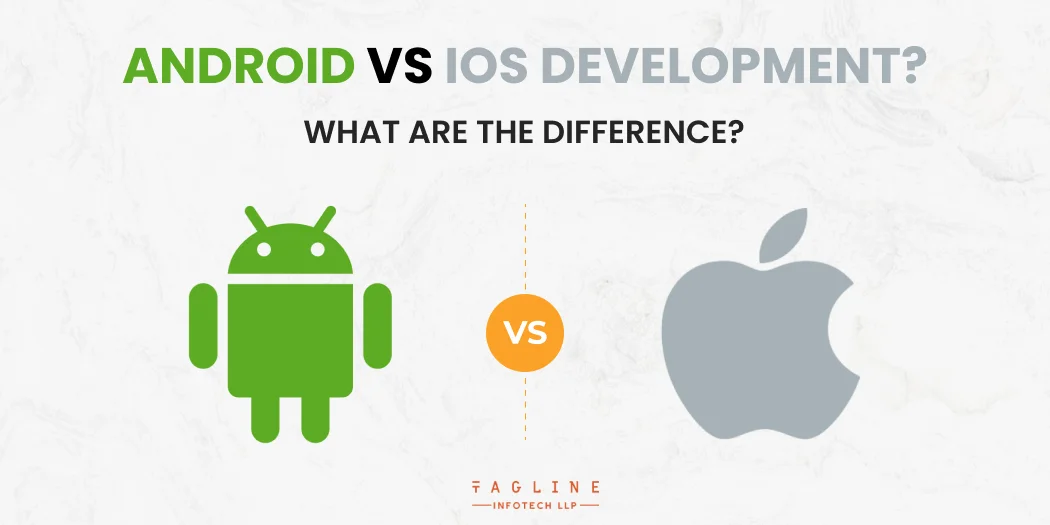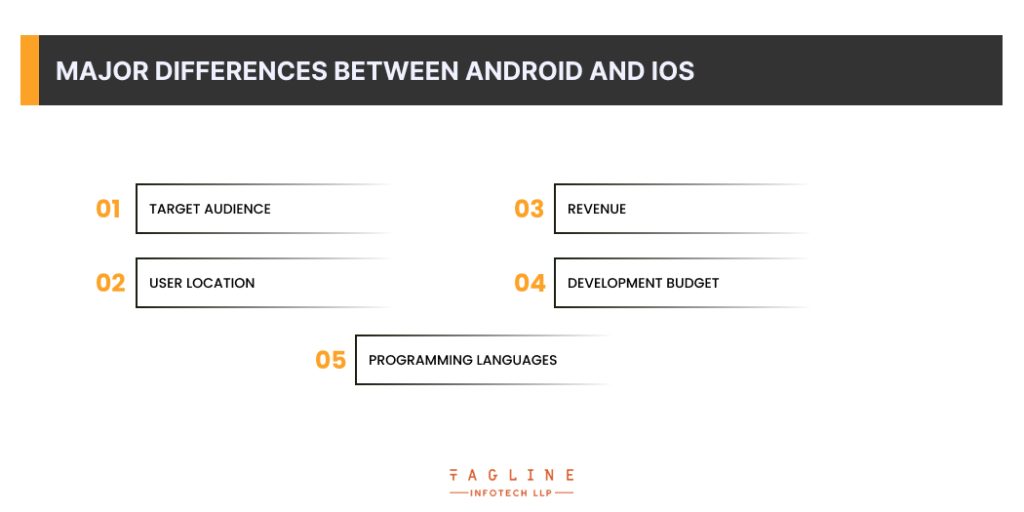Finance & IT Email Marketing: A Data-Driven Approach
February 2, 2026
Home >> iOS Development >> Android vs IOS Development : What are the difference?

Quick Summary
The ongoing tussle between two prominent mobile operating systems, Android and iOS, has fueled countless discussions. Both platforms excel in enhancing customer engagement and boosting productivity. The age-old question remains: Android or iOS? This article aims to demystify the differences of Android vs iOS development, so you can explore their pros and cons to make an informed choice.
According to Statista’s reports, the global market share for mobile operating systems is projected to reach 87.4% for Android and 12.6% for iOS by 2023. These figures surely caught your attention, right?
If you’re an entrepreneur with an eye on doubling your ROI, you must be searching for the right strategies. You might have tried various approaches, but have you considered upgrading and refining your enterprise’s mobile operating system? If not, the time is ripe to embark on this journey.
Allow us to guide you through the multitude of benefits that mobile app development, particularly Android and iOS application development (the pioneers in the field), can offer your business. Brace yourself for insights into how it can elevate various aspects of your business. Read on…
Revitalize customer engagement, amplify profitability, and bolster customer retention by embracing Android and iOS app development for your business, courtesy of Tagline Infotech! These are just a few of the numerous advantages that developing a mobile app, with the expertise of our professionals, can bring to your business.
Now, you might be pondering over the choice between Android and iOS app development. Well, in this article, we’ll take you on a journey of Android vs iOS development, exploring their core differences, including the pros and cons of each. This exploration will empower you to differentiate between the two platforms and assist you in selecting the most suitable and optimal solution for your unique business needs. Are you curious to delve deeper into this decision-making process? Let’s dive right in.
Whether you’re well-versed in Android development or stepping into this realm for the first time, one thing is certain: proper planning lays the foundation for the success of your project. Equipped with the right knowledge and tools, you’re poised for a triumphant start and a streamlined, efficient process. Are you eager to delve into the world of Android app development? Let’s embark on this journey together.
Android app development encompasses the creation of applications tailored for the Android operating system, spanning mobile, web, and other platforms. When it comes to crafting a bespoke application aligned with your business requirements, an Android application development company can be your guiding partner.
The brainchild of Google, the Android operating system finds its home on a diverse array of devices. Android app developers are the creative minds behind advanced applications designed to flourish on this platform. Let’s venture further into the realm of Android app development.
Let’s start with the positives, or the key features that make Android development so well-liked.
Some drawbacks might make Android development a complete disaster.
Tired to Searching Out ! Which platforms is best for your app development, android vs iOS?
Our Experts iOS Developer are here to simplify the right choice of app development platform. Hire us today for a consultation!
Creating mobile applications for Apple devices, including the iPhone, iPad, and iPod Touch, falls under the realm of iOS application development. Companies like Radixweb specialize in custom iPhone application development, offering their expertise in this domain.
If you’re a mobile app developer, you might have pondered the considerations of diving into iOS development. Despite these challenges, catering to the vast user base of Apple iPhone and iPad enthusiasts presents undeniable reasons for delving into iOS app development.
Let’s delve into the key advantages of iOS that set it apart:
Also Read : iOS App Development Cost: How to Keep Your Project Within Budget

Each platform in the iOS vs. Android app development debate has advantages and disadvantages. iOS is a fantastic platform for companies aiming to market to people with higher incomes since it has a premium user base and enhanced performance. Android’s larger user base, adaptability, and affordability may be attractive for greater market penetration. The decision ultimately comes down to your target market, financial constraints, and preferences for development.
Although iOS consumers frequently spend more money on in-app purchases, the broader user base of Android may still generate considerable profits.
Due to the requirement for Mac hardware and the stringent approval procedure, developing iOS apps might be more expensive.
Java or Kotlin are used to create Android apps, whereas Swift or Objective-C are used to create iOS apps.

Digital Valley, 423, Apple Square, beside Lajamni Chowk, Mota Varachha, Surat, Gujarat 394101
D-401, titanium city center, 100 feet anand nagar road, Ahmedabad-380015
+91 9913 808 2851133 Sampley Ln Leander, Texas, 78641
52 Godalming Avenue, wallington, London - SM6 8NW